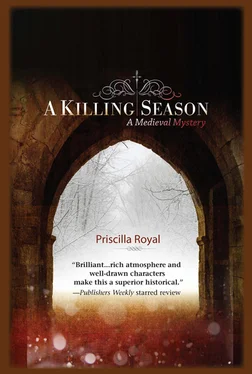Priscilla Royal - A Killing Season
Здесь есть возможность читать онлайн «Priscilla Royal - A Killing Season» весь текст электронной книги совершенно бесплатно (целиком полную версию без сокращений). В некоторых случаях можно слушать аудио, скачать через торрент в формате fb2 и присутствует краткое содержание. Год выпуска: 2011, Издательство: Poisoned Pen Press, Жанр: Исторический детектив, на английском языке. Описание произведения, (предисловие) а так же отзывы посетителей доступны на портале библиотеки ЛибКат.
- Название:A Killing Season
- Автор:
- Издательство:Poisoned Pen Press
- Жанр:
- Год:2011
- ISBN:нет данных
- Рейтинг книги:3 / 5. Голосов: 1
-
Избранное:Добавить в избранное
- Отзывы:
-
Ваша оценка:
- 60
- 1
- 2
- 3
- 4
- 5
A Killing Season: краткое содержание, описание и аннотация
Предлагаем к чтению аннотацию, описание, краткое содержание или предисловие (зависит от того, что написал сам автор книги «A Killing Season»). Если вы не нашли необходимую информацию о книге — напишите в комментариях, мы постараемся отыскать её.
A Killing Season — читать онлайн бесплатно полную книгу (весь текст) целиком
Ниже представлен текст книги, разбитый по страницам. Система сохранения места последней прочитанной страницы, позволяет с удобством читать онлайн бесплатно книгу «A Killing Season», без необходимости каждый раз заново искать на чём Вы остановились. Поставьте закладку, и сможете в любой момент перейти на страницу, на которой закончили чтение.
Интервал:
Закладка:
“It is late,” Eleanor said. “Sister Anne has long since sought our quarters to rest. I should join her.”
Hugh took her hand and kissed it. “I must seek my own bed as well. Ask your good nun to pray for me, sweet sister.” Then he vanished into the corridor to find the winding staircase leading to the chambers above.
Eleanor’s own eyes grew heavy with weariness. As she walked through the windy corridor, the stone floor damp from the storm, she wondered how troubled her dreams would be in this place so devoid of peace.
Chapter Three
Baron Herbert looked down at the bloody corpse. Was there anything in the mess of battered flesh he still recognized as his second child?
Squeezing his eyes shut, he tried to remember all that this hollow shell had once been, and, although his heart screamed in agony, his eyes remained dry, refusing to grieve. He opened them and reached out to caress his son’s twisted neck. His fingers touched skin, but he felt nothing.
“Of course I would not,” he whispered, turning his callused palm upward. “This is not my son, only inanimate clay.”
He knelt by the body and took a deep breath. The odor of death was little different from that of a slaughtered deer.
Rage filled him. Like a possessed man, he began to pound the stone floor until his hands bled. “This is still my boy,” he roared, then stared at his torn fists.
Death, violent and irreverent, was well-known to him. In war he had seen countless dead bodies: some slaughtered in combat, others in villages by soldiers still crazed with battle frenzy. He watched as men were burned to charcoal, screaming for their mothers, and walked past bodies of women raped with spears while their wailing babies were smashed against walls.
Many of these were infidels, for whom he felt no sorrow. Their death agonies were paltry aches compared to what their benighted souls would suffer in the eternal flames of Hell.
Others were known to him, men with whom he had shared wine before battle or a fire on a bitter night. For these, he felt a prick of grief, yet any sadness was offset by the knowledge that their souls were in Heaven, freed of worldly imperfections or any care.
“But this is my flesh and blood, made with my seed,” he wailed, shaking his fist at God. “My son!”
Slowly he reached up and touched the torn clothing that covered the corpse.
“Nothing,” he whispered. “Nothing.”
In utter despair, he bent double and howled like a wolf under the full moon.
***
A woman stepped back from the chapel’s open door. For a moment she stood, eyes raised, and listened to her lord husband’s wild keening.
Then Lady Margaret turned her back and walked slowly away.
Chapter Four
The wind bit like a nipping dog, but the morning sun struggled to bring warmth, albeit with a feeble touch. The scudding clouds, a mix of white and dark, promised uncertain weather.
Brother Thomas grasped his thick cloak and pulled it closer, then bent forward to look down into the cove through one of the crenels along the curtain wall near the entry gate. “I am glad we were surrounded by mist when we arrived yesterday,” he said, gazing at the narrow path leading to the drawbridge.
The cliffs on either side of the road were steep and bristled with sharp rocks. Watching the surf batter at the narrow promontory, he believed it was a miracle that even that vestige of land-bridge remained between mainland and island. Not that it would be long before the castle was irrevocably separated, he concluded. The edge of pale rock against which the drawbridge rested looked precarious, although the castle itself was settled on very solid ground.
Growing numb with the cold, he walked on, keeping close to the stone wall to avoid the full force of the wind. When he reached the protective mass of the watchtower, he paused and looked down again.
Now that the storm had abated, he could see that the cove was a rounded bay, protected from the full might of gales. There was even a sandy beach. In the summer, fishermen’s boats might be dragged up on shore to keep them safe, he thought, although the dark markings on the cliffs suggested that very high tides would render that impossible on occasion. Looking more carefully, he saw the boiling of riptides.
“No wonder the place is called Lucifer’s Cauldron,” he muttered. “There may be safety from the winds, but the incoming tides must be fierce.”
Perhaps fishermen did work along the coast in the milder seasons, he thought. When the castle was finally separated from the mainland by too great a distance for a drawbridge, provisions could be brought in by boat. For a moment, he amused himself by trying to imagine how supplies might be lifted from the bay before deciding there must be some location on the island that would prove better suited.
In this weather, he had no wish to seek it out.
A wind gust whipped around the tower and struck the monk with such force that he momentarily lost his balance. Reaching out for the wall, Thomas righted himself and then scurried toward the wide, stone staircase leading to the courtyard below. As he descended the stairs, he was passed by soldiers on their way up to take a turn on watch. He pitied them on such a bitter day.
Emerging into the bustle of castle life in the bailey, he was grateful for that comparative warmth provided by humans and animals crowded together. As he walked back to the keep, he avoided the thickest mud, mixed with manure from the various herds of long-horned goats, grunting swine, and lean-sided cows.
Briefly, he stopped to talk with a man mending a harness. Although the fellow’s fingers were red and swollen with the cold, he owned a cheerful disposition and was eager for a bit of idle chat.
When Thomas finally reached the stairs to the keep entrance, he felt a sharp pain and stopped to look at his hand. The palm was scraped from his fall against the stone wall. He shrugged. A little blood, but the wound was minor-unlike what that poor man suffered yesterday, falling from the high window.
Thomas shuddered with sympathetic terror.
He gazed up at the walls of the baron’s residence. Tilting his head, he studied the few narrow windows of the keep. How had the man fallen?
Whoever had built this fortress understood the coastal storms, as well as defensive concerns, and considered both in the design of those windows. The worst winds might drive mist, snow, and rain into the corridors of the upper halls, but the narrow windows were mostly on the leeward side, and the outer curtain walls gave the keep some additional protection. Those walls were also several feet thick.
With the thickness of the stone, the small openings and the position of the windows, Thomas could not imagine how any wind had caused the man to lose his balance. Even if he had slipped on the wet stone floor, the windows were at least waist-high. Considering all, it would be very difficult for a conscious, healthy man to accidentally tumble through the openings to his death.
Thomas knew the man might have jumped. No one had suggested such a thing when they took him to the corpse, laid out in the chapel, and asked that he do all he could for the man’s soul. If the family had suspected self-murder, none would have dared to mislead a priest about such a matter. God would know the truth. Fearful for their own souls, few would risk a lie.
Or the man could have been pushed.
Thomas hesitated, shocked at his reaction to this possibility. He ought to be distressed that the man might have been murdered. Indeed he was. He was also intrigued.
“I should be ashamed,” he muttered.
He wasn’t.
“If I long so for violence, perhaps I ought to have gone to Outremer as a soldier on pilgrimage to wrest Jerusalem from Muslim hands or become a mercenary. I am no peaceful servant of God,” he whispered to the wind, but he knew he had never truly yearned for horse and armor.
Читать дальшеИнтервал:
Закладка:
Похожие книги на «A Killing Season»
Представляем Вашему вниманию похожие книги на «A Killing Season» списком для выбора. Мы отобрали схожую по названию и смыслу литературу в надежде предоставить читателям больше вариантов отыскать новые, интересные, ещё непрочитанные произведения.
Обсуждение, отзывы о книге «A Killing Season» и просто собственные мнения читателей. Оставьте ваши комментарии, напишите, что Вы думаете о произведении, его смысле или главных героях. Укажите что конкретно понравилось, а что нет, и почему Вы так считаете.












